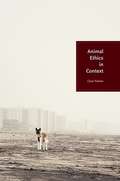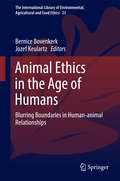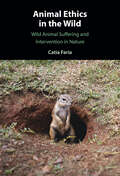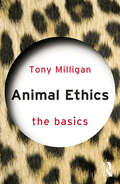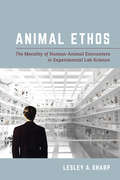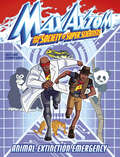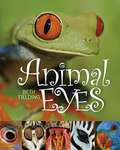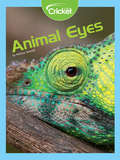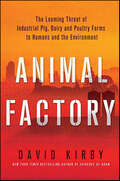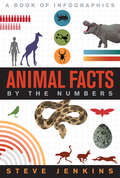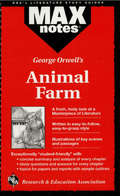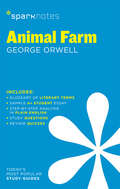- Table View
- List View
Animal Ethics in Context
by Clare PalmerIt is widely agreed that because animals feel pain we should not make them suffer gratuitously. Some ethical theories go even further: because of the capacities that they possess, animals have the right not to be harmed or killed. These views concern what not to do to animals, but we also face questions about when we should, and should not, assist animals that are hungry or distressed. Should we feed a starving stray kitten? And if so, does this commit us, if we are to be consistent, to feeding wild animals during a hard winter? <P><P>In this controversial book, Clare Palmer advances a theory that claims, with respect to assisting animals, that what is owed to one is not necessarily owed to all, even if animals share similar psychological capacities. Context, history, and relation can be critical ethical factors. If animals live independently in the wild, their fate is not any of our moral business. Yet if humans create dependent animals, or destroy their habitats, we may have a responsibility to assist them. Such arguments are familiar in human cases-we think that parents have special obligations to their children, for example, or that some groups owe reparations to others. Palmer develops such relational concerns in the context of wild animals, domesticated animals, and urban scavengers, arguing that different contexts can create different moral relationships.
Animal Ethics in the Age of Humans: Blurring boundaries in human-animal relationships (The International Library of Environmental, Agricultural and Food Ethics #23)
by Bernice Bovenkerk Jozef KeulartzThis book provides reflection on the increasingly blurry boundaries that characterize the human-animal relationship. In the Anthropocene humans and animals have come closer together and this asks for rethinking old divisions. Firstly, new scientific insights and technological advances lead to a blurring of the boundaries between animals and humans. Secondly, our increasing influence on nature leads to a rethinking of the old distinction between individual animal ethics and collectivist environmental ethics. Thirdly, ongoing urbanization and destruction of animal habitats leads to a blurring between the categories of wild and domesticated animals. Finally, globalization and global climate change have led to the fragmentation of natural habitats, blurring the old distinction between in situ and ex situ conservation. In this book, researchers at the cutting edge of their fields systematically examine the broad field of human-animal relations, dealing with wild, liminal, and domestic animals, with conservation, and zoos, and with technologies such as biomimicry. This book is timely in that it explores the new directions in which our thinking about the human-animal relationship are developing. While the target audience primarily consists of animal studies scholars, coming from a wide range of disciplines including philosophy, sociology, psychology, ethology, literature, and film studies, many of the topics that are discussed have relevance beyond a purely theoretical one; as such the book also aims to inspire for example biologists, conservationists, and zoo keepers to reflect on their relationship with animals. ""
Animal Ethics in the Wild: Wild Animal Suffering and Intervention in Nature
by Catia FariaAnimals, like humans, suffer and die from natural causes. This is particularly true of animals living in the wild, given their high exposure to, and low capacity to cope with, harmful natural processes. Most wild animals likely have short lives, full of suffering, usually ending in terrible deaths. This book argues that on the assumption that we have reasons to assist others in need, we should intervene in nature to prevent or reduce the harms wild animals suffer, provided that it is feasible and that the expected result is positive overall. It is of the utmost importance that academics from different disciplines as well as animal advocates begin to confront this issue. The more people are concerned with wild animal suffering, the more probable it is that safe and effective solutions to the plight of wild animals will be implemented in the future.
Animal Ethics: Beyond Animal Rights: Food, Pets And Ethics (The Basics)
by Tony MiliganAnimal Ethics has long been a highly contested area with debates driven by unease about various forms of animal harm, from the use of animals in scientific research to the farming of animals for consumption. Animal Ethics: The Basics is an essential introduction to the key considerations surrounding the ethical treatment of animals. Taking a thematic approach, it outlines the current arguments from animal agency to the emergence of the ‘political turn’. This book explores such questions as: Can animals think and do they suffer? What do we mean by speciesism? Are humans special? Can animals be political or moral agents? Is animal rights protest ethical? Including outlines of the key arguments, suggestions for further reading and a glossary of key terms, this book is an essential read for philosophy students and readers approaching the contested field of Animal Ethics for the first time.
Animal Ethos: The Morality of Human-Animal Encounters in Experimental Lab Science
by Lesley A. SharpWhat kinds of moral challenges arise from encounters between species in laboratory science? Animal Ethos draws on ethnographic engagement with academic labs in which experimental research involving nonhuman species provokes difficult questions involving life and death, scientific progress, and other competing quandaries. Whereas much has been written on core bioethical values that inform regulated behavior in labs, Lesley A. Sharp reveals the importance of attending to lab personnel’s quotidian and unscripted responses to animals. Animal Ethos exposes the rich—yet poorly understood—moral dimensions of daily lab life, where serendipitous, creative, and unorthodox responses are evidence of concerted efforts by researchers, animal technicians, veterinarians, and animal activists to transform animal laboratories into moral scientific worlds.
Animal Experimentation
by Vaughan MonamyAnimal Experimentation is an important book for all those involved in the conduct, teaching, learning, regulation, support or critique of animal-based research. Whilst maintaining the clarity of style that made the first edition so popular, this second edition has been updated to include discussion of genetically modified organisms and associated welfare and ethical issues that surround the breeding programs in such research. It also discusses the origins of vivisection, advances in human and non-human welfare made possible by animal experimentation, principle moral objections to the use of research animals, alternatives to the use of animals in research, and the regulatory umbrella under which experiments are conducted in Europe, USA and Australasia. In addition, the book highlights the future responsibilities of students who will be working with animals, and offers practical advice on experimental design, literature search, consultation with colleagues, and the importance of the on-going search for alternatives.
Animal Extinction Emergency: A Max Axiom Super Scientist Adventure (Max Axiom And The Society Of Super Scientists Ser.)
by Emily SohnCountless animals around the world are in danger of dying out! But why are species going extinct, and what happens when we lose them? In this nonfiction graphic novel, Max Axiom and the Society of Super Scientists are on a mission to find out. Using their superpowers and super-smarts, the team will break down this urgent issue into an exciting, fact-filled adventure so young readers can learn about the causes and effects of animal extinction and endangerment and discover steps we can all take to save Earth’s wildlife.
Animal Eyes
by Beth FieldingANIMALS. This bright, colorful book explores the sensational variety of eyes in the world's animals. Discover trick eyes, sideways eyes, glow-in-the-dark eyes, giant eyes, see-through eyes, and so many more. <p><p> Chameleons clean their eyes with their tongues, while camels and crocodiles have thin membranes over their eyes to protect them from damage during sandstorms and feedings. Giant squids have the largest eyes, and some spiders have eight eyes! Animals such as raccoons and tigers have accent fur around their eyes, making them look more ferocious, while animals such as butterflies and fish have fake eyes used to trick predators. <p> Fun, easy experiments that illustrate the way animal eyes work, and cool eye facts to gross out family and friends. Glossary and index included. Real science has never been so much fun! Ages 4+.
Animal Eyes
by Melissa StewartLike you, most animals have eyes. But how and what they see can be very different.
Animal Fact Animal Fable
by Seymour SimonDescribes common beliefs about animals and explains which are fact and which are fable.
Animal Factory: The Looming Threat of Industrial Pig, Dairy, and Poultry Farms to Humans and the Environment
by David KirbySwine flu. Bird flu. Unusual concentrations of cancer and other diseases. Massive fish kills from flesh-eating parasites. Recalls of meats, vegetables, and fruits because of deadly E-coli bacterial contamination. Recent public health crises raise urgent questions about how our animal-derived food is raised and brought to market. In Animal Factory, bestselling investigative journalist David Kirby exposes the powerful business and political interests behind large-scale factory farms, and tracks the far-reaching fallout that contaminates our air, land, water, and food. In this thoroughly researched book, Kirby follows three families and communities whose lives are utterly changed by immense neighboring animal farms. These farms (known as "Concentrated Animal Feeding Operations," or CAFOs), confine thousands of pigs, dairy cattle, and poultry in small spaces, often under horrifying conditions, and generate enormous volumes of fecal and biological waste as well as other toxins. Weaving science, politics, law, big business, and everyday life, Kirby accompanies these families in their struggles against animal factories. A North Carolina fisherman takes on pig farms upstream to preserve his river, his family's life, and his home. A mother in a small Illinois town pushes back against an outsized dairy farm and its devastating impact. And a Washington State grandmother becomes an unlikely activist when her home is invaded by foul odors and her water supply is compromised by runoff from leaking lagoons of cattle waste. Animal Factory is an important book about our American food system gone terribly wrong---and the people who are fighting to restore sustainable farming practices and save our limited natural resources.
Animal Facts: By the Numbers (By the Numbers)
by Steve JenkinsFrom the beloved Caldecott Honor-winning author of What Do You Do with a Tail Like This? comes another stunning, informative reader in the By the Numbers series. In this installment, Jenkins explores a wide range of facts and data about animals all over the world, some familiar, some new, but all fascinating!In this latest stunning, informative reader in Steve Jenkins's By the Numbers series, we dive deep into the world of animals and insects. From the smallest known species of snake to the sleepiest mammals, Animal Facts By the Numbers provides readers of all ages with the ultimate animal trivia knowledge.Illustrated with innovative infographs and beautiful full color art, these are books to pore over.
Animal Families (Introducing Living Things)
by Bobbie KalmanChildren love to read about different kinds of animal families. In this fascinating new book, simple text explains how animals behave toward their young in different and sometimes surprising ways, from fish and reptile mothers who leave their young to fend for themselves to male wolves and penguins who help raise their babies. Engaging photographs also show how mammal mothers teach their young survival skills and how some animals live together in groups.
Animal Families: Wild cousins around the world
by Matt SewellCan you spot the family resemblance between a laughing kookaburra and a brightly coloured kingfisher? What about the elephant hawkmoth and the hummingbird hawkmoth? Did you know that the South American coati belongs to the same family group as the North American raccoon?Discover the family ties that stretch around the world with 21 fascinating animal families. From the various species of the fox family, to bears, owls, dolphins, cobras and more, discover the differences - and the similarities - of animals that are part of the same family, but might live continents apart.A celebration of the amazing diversity of the natural world and fascinating shared connections, brought to life with beautiful watercolour illustrations by bestselling author-illustrator Matt Sewell.
Animal Farm (MAXNotes Literature Guides)
by Joseph ScaliaREA's MAXnotes for George Orwell's Animal Farm MAXnotes offer a fresh look at masterpieces of literature, presented in a lively and interesting fashion. Written by literary experts who currently teach the subject, MAXnotes will enhance your understanding and enjoyment of the work. MAXnotes are designed to stimulate independent thought about the literary work by raising various issues and thought-provoking ideas and questions. MAXnotes cover the essentials of what one should know about each work, including an overall summary, character lists, an explanation and discussion of the plot, the work's historical context, illustrations to convey the mood of the work, and a biography of the author. Each chapter is individually summarized and analyzed, and has study questions and answers.
Animal Farm An English Coursebook for Undergraduates - RTMNU
by George OrwellAnimal Farm is a novella by George Orwell, and is the most famous satirical allegory of Soviet Totalitarianism. Published in 1945, the book reflects events leading up to and during the Stalin era, Orwell, a democratic socialist, and a member of the Independent Labour Party for many years, was a critic of Joseph Stalin, and was suspicious of Moscow-directed Stalinism after his experiences with the NKVD during the Spanish Civil War. The book was chosen by Time Magazine as one of the 100 best English-language novels (1923 to 2005) The short novel is an allegory in which animals play the roles of the Bolshevik revolutionaries and overthrow and oust the human owners of the farm, setting it up as a commune in which, at first, all animals are equal, class and status disparities soon emerge however, between the different animal species. The novel describes how a society's ideologies can be manipulated and twisted by individuals in positions of social and political power, including how a utopian society is made impossible by the corrupting nature of the very power necessary to create it.
Animal Farm SparkNotes Literature Guide (SparkNotes Literature Guide Series #16)
by SparkNotesAnimal Farm SparkNotes Literature Guide by George Orwell Making the reading experience fun! When a paper is due, and dreaded exams loom, here's the lit-crit help students need to succeed! SparkNotes Literature Guides make studying smarter, better, and faster. They provide chapter-by-chapter analysis; explanations of key themes, motifs, and symbols; a review quiz; and essay topics. Lively and accessible, SparkNotes is perfect for late-night studying and paper writing. Includes:An A+ Essay—an actual literary essay written about the Spark-ed book—to show students how a paper should be written.16 pages devoted to writing a literary essay including: a glossary of literary termsStep-by-step tutoring on how to write a literary essayA feature on how not to plagiarize
Animal Fathers (Fountas & Pinnell Classroom, Guided Reading Grade 1)
by Alice McGintyNIMAC-sourced textbook
Animal Feeding And Nutrition
by Marshall Jurgens Kristjan Bregendahl Jozie Coverdale Stephanie HansenAuthors Marshall Jurgens and Kristjan Bregendahl have been joined by new authors Josie Coverdale and Stephanie Hansen to create the 11th edition of Animal Feeding and Nutrition. Animal Feeding and Nutrition is written in a clear and concise outline format, reducing the vast amount of reading sometimes necessary for complete coverage of feeding practices.
Animal Fiction in Late Twentieth-Century Canada (Palgrave Studies in Animals and Literature)
by Alice HiggsAnimal Fiction in Late Twentieth-Century Canada fulfils a vital contribution to the conversation surrounding animal representation as a point of continuity in national narratives and supports the idea that focusing on narratives of responsibility and care influences better relations with both non-human animals and across settler-Indigenous boundaries. Alice Higgs engages with on-going debates regarding reconciliation by demonstrating that it is imperative to critique settler colonial environmental frameworks and place autonomy back into Indigenous communities by bringing Indigenous practices of custodianship and relationality to bear more generally. This book also develops a number of conversations in animal studies in relation to the politics of representation. Higgs studies a range of canonical Canadian authors, demonstrating a progress across the period in which it is possible to identify the emergence of a literary pro-animal turn.
Animal Firefighters to the Rescue
by Sonja ColeClimate change affects many regions with hotter and drier weather, and forest fires are a growing problem. Learn how hungry animals might help reduce wildfires. Fires need fuel, oxygen and heat to start a flame. The forest floors are covered with dry grass, dead wood, and bark called duff–fire fuel! Learn how conservationists are using sheep, goats, beavers and other animals to reduce fires!
Animal Folk Tales of Britain and Ireland
by Sharon Jacksties Bea BaranowskaStories and animals have long travelled the same routes. Through our heritage of charming, quirky and profound tales, you will find yourself re-acquainted with Britain’s wondrous fauna. Find out how hedgehog ended up with spines and what makes him scuttle so fast, discover how pigs saved a prince from leprosy and why the wealthy lord was so intent on capturing the black fox. Sharon Jacksties’ wonderful book combines traditional stories, little-known zoological facts and true anecdotes to create a treasure trove of stories for animal lovers of every kind.
Animal Folklore: From Black Cats to White Horses
by Edward F. DolanFrom our earliest days, we have had a unique relationship with animals. We have made them deities, empowering them with magic. We have worked them, sharing our toil and sweat in the fields. We have nurtured them, holding the pain of the world at bay. And with this special bond has come folklore: words, phrases, beliefs, and stories that have always influenced our lives. Now, in this exciting compendium of bon mots, history, myths, and tales, you'll learn: The reasons why we hold black cats in superstitious awe Myths surrounding snakes, bats, spiders, and birds of the forest Comments, proverbs, rhymes, and beliefs about dogs and cats, field and barnyard animals, horses, woodland creatures, and insects The connections between horseshoes and good luck, geese and gold, animal bones and medical treatment, and more Animal expressions and their roots, such as "It's raining cats and dogs" and "He's like an elephant, he never forgets" And many more!
Animal Friends to Sew: Simple Handmade Decor, Toys, and Gifts for Kids
by Sanae IshidaSew adorable animal-themed projects for kids' room decor, handmade toys, and wearable accessories.Create beautiful handmade animal friends for the whole family: a darling whale teether, adorable fox baby slippers, stackable animal blocks, a sweet lion throw pillow, or a fuzzy sheep backpack! Perfect for gifting, these one-of-a-kind handmade treasures are sure to be cherished. Inspired by the beautiful simplicity of Japanese and Scandinavian design, these projects will delight the creator as much as the recipient. 15 beginner-friendly projects with 35+ variations. Includes lookbook at the front followed by a sewing and embroidery primer, project instructions with photos and step-by-step illustrations, and templates at the back.
